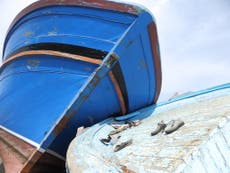Migrant crisis: Face to face with the disaster in the Mediterranean
We may never know how many people were trapped in the belly of the boat when it sank
Ever since I began working on a search-and-rescue boat in the Mediterranean this May, I’ve been dreading the day that we would respond to a distress call only to arrive and find that it was too late.
It was my colleagues on Médecins Sans Frontières’ boat the Dignity First who got that awful call.
They arrived to a horrific scene. A boat reported to be carrying 700 people had already sunk. People were desperately clinging to life jackets and anything else they could find in the fight for their lives. Others were drowning and some had already died. The few possessions people take with them on these desperate journeys were floating in the water.
The team dispatched rescue boats, threw life jackets overboard and started pulling people from the sea. Among the rescued was Mohammed, a Palestinian who had saved his 18-month-old daughter Azeel and his pregnant wife.
We may never know how many people were trapped in the belly of the boat when it sank. Their only escape would have been through a small hatch and, if the boat went down fast, the chances of making it out alive would have been minimal.
When I think of those people trapped in that hull, I reflect on those we have rescued and the stories I have heard. Far from the characterisation by politicians and some sections of the media, the majority of those crossing the Med are running for their lives. Most are fleeing the increasingly brutal war in Syria, life under a repressive regime in Eritrea or conflict and violence in Afghanistan. There are others, working in Libya, who found themselves caught up in chaos with no choice but to take to a leaky boat in fear for their lives.
People talk of horrendous journeys on land even before boarding these boats. Some are herded into trucks to cross deserts; others fall ill but are left to die on the side of the road. Those who pass through Libya talk of rape, torture, kidnap and murder before they are led into a rickety, overcrowded vessel, often at gunpoint, with no possibility of opting out.
The youngest person we have rescued was a two-month-old baby girl from Syria. We asked her parents why they made such a dangerous journey with so young a child. Their response was the same as everyone’s: they know they might lose their lives but they have no other way to reach Europe. Most Syrian families opt to stay in the region but those that do not must first place themselves and their families at even more risk by crossing the Mediterranean.
As I, watching from afar, see small numbers of people trying to reach Britain from Calais and hear the Government talk of “sending a strong message”, I feel a mixture of anger and shame. To hear the Prime Minister referring to people crossing the Mediterranean as a “swarm” is disgusting and dehumanising. These are the same people that just months ago David Cameron said he was committed to saving when, amid huge fanfare, he deployed HMS Bulwark. This boat has now been withdrawn, replaced by a vessel patrolling the Med collecting information to undermine the smuggling industry – a booming trade fuelled by the desperation caused by the lack of safe, legal alternatives.
There are more people fleeing war, conflict, violence and persecution in the world than at any time in history but, as the scale of suffering increases, the political response hardens. Countries build higher walls, seal land borders and politicians seek to dehumanise or criminalise those caught up in this crisis. The people I have met are the victims of Europe’s repressive policies – of our failure to offer protection and safety to some of the world’s most vulnerable people, a failure that leads to untold suffering and loss of life.
Will Turner is an emergency co-ordinator for Médecins Sans Frontières who was involved in the rescue effort in the Mediterranean




Join our commenting forum
Join thought-provoking conversations, follow other Independent readers and see their replies